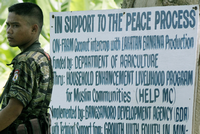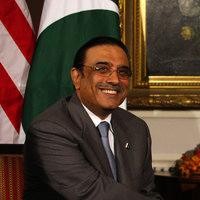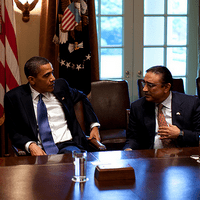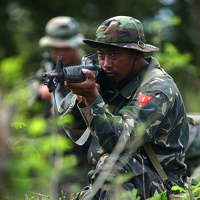Asia-Pacific Archive
Free Newsletter

Editor’s note: This is the second of a two-part series. Part I examined the need for a global economic grand bargain. Part II examines what such an economic grand bargain might look like. BEIJING — The recent market correction and an increasingly bleak economic outlook have sharpened the case for a G-20 economic grand bargain. China has the capacity to take a lead in any such arrangement, using its $3 trillion foreign exchange reserves as bargaining chips for reshaping the global economy to better suit its interests. This could form the bedrock of broad-based and coordinated policy action to address […]
Myanmar allowed a U.N. human rights envoy to visit the country for the first time in more than a year this week, prompting reports that President Thein Sein may be seeking a new era of dialogue with the international community — particularly those critical of the country’s repeated bloody crackdowns on democracy advocates. Western rights organizations and governments have long called for the release of more than 2,000 political prisoners in Myanmar, and, according to Renaud Egreteau, a political scientist and Myanmar specialist at the University of Hong Kong, “Thein Sein now aims to reconnect with regional players.” Egreteau, who […]

President Benigno Aquino of the Philippines surprised many when he covertly met Murad Ibrahim, the leader of the Moro Islamic Liberation Front (MILF), in Tokyo on August 4. The meeting was a clear step forward in a peace process that has haltingly dragged on for some 14 years. Yet the ripple effects it generated exemplify the intractability of the Moro issue and have added a new sense of urgency to the process. Although the content of the meeting remains unreported, it is generally agreed that the event was at least a useful trust-building exercise between warring parties struggling to overcome […]

Editor’s note: This is the first of a two-part series. Part I examines the need for a global economic grand bargain. Part II, which will appear tomorrow, will examine what such an economic grand bargain might look like. BEIJING — When the global financial crisis broke in 2008, rather than allow economic forces to run their course, policymakers intervened to set the unholy precedent of nationalizing financial market risks. Moreover, this was done without addressing the structural imbalances behind the boom and bust. Events of the last three weeks have demonstrated the fundamental ineffectiveness of previous interventions and underscored the […]

Ian Bremmer, the founder and head of Eurasia Group (for which I work as an analyst), has argued that we are living in a “G-Zero” world, or one in which there is no genuine great-power leadership. From the perspective of political science, it is hard to disagree, as anyone reading a newspaper these days can attest. Still, the historian in me says this situation cannot last for too long. My reasoning here has nothing to do with the global correlation of military force, since thanks to globalization’s emerging middle class, “butter” will inevitably emerge as the winner over “guns.” Instead, […]
At long last, Washington looks ready to pass free trade agreements with Colombia, Panama and South Korea. Congressional ratification has been a long time in the making — the trade agreement with Colombia was signed in 2006, while the agreements with Panama and South Korea were inked in 2007. The trade deals with Colombia and Panama were, in some sense, part of a last-ditch effort by President George W. Bush to salvage the work put in by former Presidents George H.W. Bush and Bill Clinton to create the Free Trade Area of the Americas. Hopes for that hemisphere-wide trade zone […]

Amid the anxiety and devastation of the London riots, there was one brief comic interlude, when the government of Iran urged British authorities to use restraint in dealing with protesters. The appeal was bitterly amusing, of course, because of the brutal tactics Tehran used to put down protests in 2009. Police in London managed to end the rioting using traditional crowd-control methods. But then, in the wake of a public outcry over the disturbances and the disappointing performance of the police, British Prime Minister David Cameron made a highly controversial proposal: Next time, he suggested, the government might choke off […]

On Aug. 1, local government officials in China’s Xinjiang province alleged that the ringleader of a deadly attack in Kashgar had been trained in Pakistan. The accusation has injected some sourness into a bilateral relationship often described as “sweeter than honey.” In fact, contrary to the sappy rhetoric, China-Pakistan ties have rarely been trouble-free — and the points of tension long predate what happened in Kashgar. One example is the plight of Pakistan-based Chinese nationals. According to estimates gathered from Pakistani and Chinese media sources, about 35 Chinese workers were kidnapped, killed or maimed in the country between 2004 and […]

The biggest defense news from the past week concerned the beginning of sea trials for China’s first aircraft carrier, Varyag. A former Soviet/Ukrainian hulk and the sister ship of the Russian aircraft carrier Admiral Kuznetsov, Varyag finally set sail after a long process of refurbishment. The ship, which may now go by the name Shi Lang, will likely only serve as a training carrier, but her embarkation on trials has generated great consternation among observers of the Asian naval scene. Officials from both the United States and Japan have asked China to explain its need for an aircraft carrier, as […]
There are two interesting U.S. angles to the recent spate of high-level defense contacts between Israel and China. The first has to do with the respective roles each country plays in the domestic U.S. discourse, with Israel universally portrayed as the United States’ most stalwart ally and China increasingly portrayed as our most likely future peer competitor. This Manichean view is especially pronounced among the Tea Party and Christian Zionist wings of the GOP, but is also present in moderate Republican and Democratic circles. So it will be interesting to see how a closer defense relationship between the two plays […]
In thinking about how to support the twin goals of deterrence and assurance, the Obama administration has been struggling with how best to integrate U.S. nuclear weapons, conventional forces and missile defenses into a coherent strategic posture. Now budgetary pressures are making the trade-offs involved in striking the necessary balance for such an initiative even sharper. These three military tools interact in complex ways. Nuclear forces are very powerful but for the most part unusable due to their destructiveness and the taboo associated with their use. Their main value is therefore to deter adversaries and reassure allies, thereby helping to […]

As the Republican-controlled House advances its legislative agenda, U.S. civilian assistance to Pakistan looks likely to be one of the early casualties. In addition to new conditions on assistance to Pakistan, approved by two House panels, White House officials expect that the overall aid package is likely to shrink as well. But before lawmakers cut aid to Islamabad, they should consider the role it plays in realizing long-term U.S. interests. The Enhanced Partnership with Pakistan Act of 2009, more commonly known as the Kerry-Lugar-Berman Act, tripled financial assistance to Pakistan’s civilian institutions by pledging $1.5 billion annually for five years. […]
Thailand’s new Prime Minister Yingluck Shinawatra made headlines this week by forming a cabinet void of any members tied to the nation’s pro-democracy “Red Shirt” movement. Yingluck is the sister of Thaksin Shinawatra, who was ousted from the prime minister seat in 2006 by a military coup, and it is widely accepted that her election as the first female to hold the office depended heavily on support from the Red Shirts. But she’s taking care now not to identify herself too closely with the movement whose massive demonstrations brought Bangkok to its knees last year. According to Paul Chambers, head […]

Despite numerous statements by Philippine and U.S. authorities over the past few years highlighting progress in the fight against terrorism, recent events in the southernmost corner of the Philippines show that the battle there is far from won. On Aug. 1, seven Philippine marines were killed — five of them beheaded or mutilated — and 21 others wounded after being ambushed by some 300 alleged members of the Abu Sayyaf Group (ASG) in Patikul, in the Sulu Archipelago. Unconfirmed reports say that 11 ASG members were also killed in the fighting. The ASG, often labeled a local terrorist group, has […]
